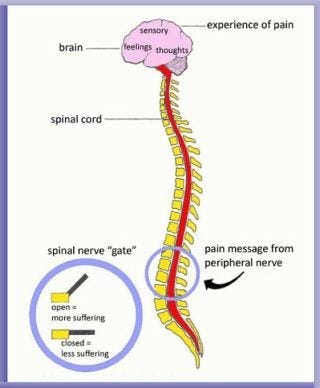There is a direct link between your pain and the brain. However you may well have heard the statement ‘it’s all in your head’. I have sadly come across many people who have been told this by others including medical professionals.
Whilst pain is not 'all in your head' in the sense it is made up. We know that pain is made entirely in the brain. This doesn’t mean your pain is any less real, it DOES NOT mean that you are making it up – it’s just that your brain decides whether you feel no pain, a little pain or a lot of pain.
Pain is an alarm system, with chronic pain the alarm system is over sensitive.
A growing understanding of chronic pain has seen a shift from a ‘biomedical’ model of pain to what we call a “biopsychosocial” model of pain management.” This view allows us to see a person holistically, looking at social/ cultural factors, emotional and biological factors.
Pain and emotion pathways overlap in the brain. There is a shared neural network because it allows the brain to process a lot of sensations at once. Negative emotions are like adding fuel to a fire. This can be explained by something called the pain gate theory. Imagine there is a gate on your spinal cord, this is where pain messages are sent to your brain.
When you might feel depressed or anxious, the gate is essentially open so more pain signals are sent to the brain. When we are feeling, happy, content or balanced the gate can be closed, so less pain can be experienced.
Positive emotions can also significantly lower pain when people stop focusing on the pain. When people are living in line with their values they are more likely to engage in behaviours which will help there overall wellbeing such as exercise, meditation and sleeping well. Engaging in these helpful behaviours can help break the cycle of chronic pain where people can spend a lot of time ruminating about their pain. The feel good hormones when engaging in a meaningful activity can be a way for the body to produce their own natural pain relief.
How can Psychological Therapy help with Pain?
The goals of Cognitive Behavioural Therapy (CBT) in pain management include reducing the impact pain has on your daily life, learning skills for better coping with pain, improving physical and emotional functioning and well-being.
When people experience persistent pain and fatigue, it is easy to get into habits of activity and rest that may not be the best way to deal with the pain and fatigue. CBT can help to identify those unhelpful ways of thinking and acting, and help us make healthy and positive changes, and therefore reduce the impact of the pain.
CBT can help you feel more confident and empowered to manage your pain and take back control!






Great article! I’m really interested in this. It will help a lot of people. Looking forward to hearing more about it.